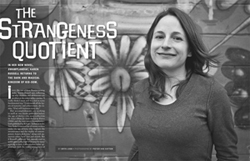Poets & Writers Magazine welcomes feedback from its readers. Please post a comment on select articles at www.pw.org/magazine, e-mail editor@pw.org, or write to Editor, Poets & Writers Magazine, 90 Broad Street, Suite 2100, New York, NY 10004. Letters accepted for publication may be edited for clarity and length.
Inspired by the Maze I enjoyed reading the profile of Swamplandia! author Karen Russell, “The Strangeness Quotient”
(March/April 2011) by Eryn Loeb. It was inspiring to learn that someone of
Russell’s ability and talent compares the writing process to “navigating a
vast, mazelike swamp.” As a beginning writer, I now realize there is no need to
get “stuck” in any particular place in a story. Considering Russell’s
experience with process freed me from the myth that writing must have a neat
formula with a fixed beginning, middle, and end.
I enjoyed reading the profile of Swamplandia! author Karen Russell, “The Strangeness Quotient”
(March/April 2011) by Eryn Loeb. It was inspiring to learn that someone of
Russell’s ability and talent compares the writing process to “navigating a
vast, mazelike swamp.” As a beginning writer, I now realize there is no need to
get “stuck” in any particular place in a story. Considering Russell’s
experience with process freed me from the myth that writing must have a neat
formula with a fixed beginning, middle, and end.
Pinara Smith
Canton, Michigan
Commanding Courage
My first issue of Poets
& Writers Magazine arrived and I was excited to read Kevin
Nance’s cover profile of poet Nikky Finney, a story about a writer’s
responsibility to be fearless (“The Wider Sky,” March/April 2011). In the middle
of retelling a defining event from Finney’s youth in which she fights with a
white boy for calling her brother a nigger, the author chickens out and uses
the phrase “the N-word.” This is not truth telling. This is not fearlessness.
The boy did not call her brother “the N-word”; he called him “nigger.” To use
the politically correct substitute not only undermines the whole point of the
article, but also neutralizes the impact of the event, insulting the courage
and integrity of Finney as a black author in a still racially divided America,
and the intelligence of the audience of Poets
& Writers Magazine. I hope this was merely a moment of cowardice
on behalf of Nance and not the trend of this magazine.
Rainey Taylor
Eugene, Oregon
Kevin
Nance responds:
In our interview, Nikky
Finney said “N-word” in telling the anecdote, but I didn’t repeat the story as
a quote; I paraphrased, so the choice of “N-word” in the article was mine, and
I take responsibility for it. Rainey Taylor has a strong point, but I would
argue that it’s a subject of considerable complexity, not the cut-and-dried
matter that Taylor presents. As we saw recently with the controversy over the
new, expurgated edition of Mark Twain’s Adventures
of Huckleberry Finn (NewSouth
Books, 2011), there continue to be many thoughtful people of all races who take
great offense at that still-hated, still-painful term being used in any
context. And I made my choice largely based on that. My article made clear what
was said on that school ground in South Carolina without repeating the word
itself, and I remain comfortable with my decision, even as I recognize the
validity of the opposing point of view.
Makers Versus Merchants
Thanks for Gabriel Cohen’s “Publishing in the
Twenty-First Century: An Interview With John B. Thompson” (March/April 2011).
The article implies what I’ve been thinking for a while now: Most people
writing book manuscripts today will never be published. And this is a good
thing, because it will eventually nudge out those writers who are solely intent
on publishing. Many forget that the job of the publisher is to publish; the job
of the writer is to write.
Susan Richardson
Boise, Idaho
Straddling Technologies
As a writer, teacher, and 1950s student of the Palmer
Method of penmanship, I empathize with the nostalgia Eileen Pollack feels for
the process of handwriting described in “Track Changes: Ditto Machines to
Digital Literature” (March/April 2011). I write by hand all my first drafts.
When typing them into my computer, I edit. Works for me.
Jacqueline Signori
Fairfield, Iowa







